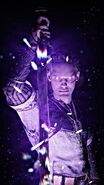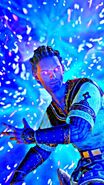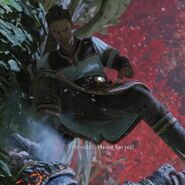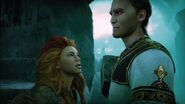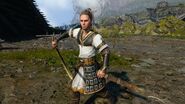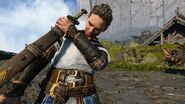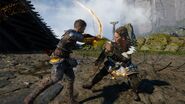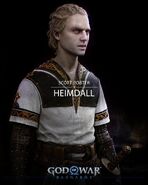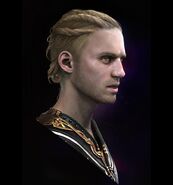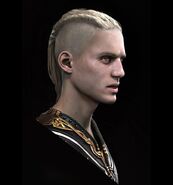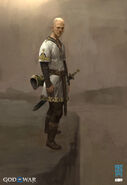
This article contains lore based on real-life sources from Norse mythology as introduced from the God of War Norse era.
| “ | Don’t you know who I am? I am the watchman of the Aesir! The Herald of Ragnarök! | ” |
–Heimdall during his duel with Kratos | ||
Heimdall (Old Norse: Heimdallr, Nordic: ᚺᛖᛁᛗᛞᚨᛚᛚ), also famed as the Watchman of the Aesir, the Bearer of Gjallarhorn and the Herald of Ragnarök, was the Norse God of Foresight, Surveillance, Order and Foreknowledge. Confirm said by Mimir, he is a true believer of Odin, supporting him in his rule as All-Father.
Convinced very early of the natural superiority of the Aesir upon the other races, Heimdall witnessed the rise of Asgard and enforced its ascendancy upon the other realms, waging Odin's wars with genuine pleasure. Due to his exceptional gifts of intuition and his devotion to Odin, the God of Foresight quickly accumulated honors and wealth, and was gifted the legendary Hofuð by the best Asgardian master smiths. Protector of the prestigious High House of powered Aesir, Heimdall saw his destiny truly change the day Odin gave him Gjallarhorn for safe-keeping, knowing that no one would be able to outsmart the Watchman. Such privilege further reinforced his fanatical devotion to the All-Father as much as his supposed superiority over his own kin.
The Scion of the Aesir then dedicated his life to the protection of the realm he loves and more specifically to the Bifröst, whose surveillance is made possible thanks to his unparalleled vision. Reading minds for the All-Father, Heimdall knows and sees everything, making him the perfect henchman. No one walks through the Walls of Asgard without his assent, and the Bearer of Gjallarhorn is destined to blow the legendary horn the day the Giants will assault Asgard, thus bringing forth Ragnarök.
Heimdall is introduced in God of War Ragnarök as its tertiary antagonist, playing a crucial role in the storyline as the Herald of Ragnarök, and his fate destined to face his archnemesis, Loki. His cleverness is matched only by his utter loyalty and his desire to prove himself to the All-Father, whom he seeks to protect at any price. Although Odin has personally invited Atreus to Asgard, Heimdall instantly notices the boy's misguided intentions and secretly plans to dispose of him. Because of this, Heimdall soon becomes himself a target of Kratos, the latter having inadvertently learned the God's intentions thanks to the Norns.
In Vanaheim, Heimdall, riding his personal mount Gulltoppr, engages the Ghost of Sparta in a vicious duel, holding his own thanks to his incredible foresight. But his situation becomes grim as Gulltoppr is slain and as soon as Kratos lands his first hit, Heimdall becomes enraged and prompt to mistakes. His arrogance ultimately leads the God of Foresight to receiving a rather brutal death at the hands of Kratos, who promptly recovers Gjallarhorn in the process. The demise of Heimdall proves to be a huge blow to Asgard, now without any means to warn and gather the Aesir for Ragnarök.
Quick Answers

What role does Heimdall play in the God of War Norse era?

What are Heimdall's powers in Norse mythology?

How does Heimdall's foresight and surveillance contribute to his role as the Watchman of the Aesir?

What is the significance of Heimdall's Gjallarhorn in Norse mythology?

How does Heimdall support Odin in his rule as All-Father?

In Norse Mythology
In norse mythology, Heimdallr is a god who possesses the resounding horn Gjallarhorn, owns the golden-maned horse Gulltoppr, is called the shining god, the whitest of the gods or the god with gold teeth. Heimdallr is the son of Odin and the nine daughters of Ægir and Rán (goddesses that personified waves) who are Bára (or Drǫfn), Blóðughadda, Bylgja, Dúfa, Hefring, Himinglæva, Hrǫnn, Kólga and Unnr, although in the poem Völuspa hin Skamma it is claimed that Heimdallr is the son of Odin and nine sisters giantesses who are Angreyja, Atla, Eistla, Eyrgjafa, Gjálp, Greip, Imor (or Sindur), Járnsaxa and Ulfrún. Heimdallr is attested as possessing foreknowledge, keen eyesight and hearing, and keeps watch for invaders and the onset of Ragnarök while drinking fine mead in his dwelling Himinbjörg, located where the burning rainbow bridge Bifröst meets the sky. Heimdallr is said to be the originator of social classes among humanity and once regained Freyja's treasured possession Brísingamen while doing battle in the shape of a seal with Loki. Heimdallr and Loki are foretold to kill one another during the events of Ragnarök. Heimdallr is additionally referred to as Rig, Hallinskiði, Gullintanni and Vindlér or Vindhlér.
Heimdallr is attested in the Poetic Edda, compiled in the 13th century from earlier traditional material; in the Prose Edda and Heimskringla, both written in the 13th century by Snorri Sturluson; in the poetry of skalds; and on an Old Norse runic inscription found in England. Two lines of an otherwise lost poem about the god, Heimdalargaldr, survive.
Codex Description
| “ | Heimdall, the bearer of Gjallarhorn. Mimir said he was dangerous, a "true believer" of Odin. He didn't mention what a complete jerk he is. Or that he seems able to read people somehow. The less time I spend around this guy, the better... | ” |
–Atreus | ||
| “ | Heimdall was everything described - a cruel, pompous bully, and a formidable foe. His gifts of intuition were nothing to be ignored, nor was his unexpected mastery of the Bifröst. When I struck a blow that should have ended the fight, I tried to heed the voice in my head, that he was beaten, not worth killing. But Heimdall sensed my pity, and it shamed him. His pride would not allow him to accept my mercy... so in the end I gave him none. It was not my choice... and yet, I feel... satisfied. Have I proved the Norns wrong, or I have proved them right? | ” |
–Kratos | ||
In the God of War Series
Backstory
Born
Heimdall was born in Gladsheim, in Asgard, and as an adult, he was appointed as the watchmen of the Aesir and received Gjallarhorn from the All-Father, to whom Heimdall swore loyalty to for the rest of his life, Heimdall was tasked with protecting Asgard and to warn the realms when Ragnarök began. During his years of service, Heimdall engaged in many battles and fights, and was never once touched or harmed thanks to his enhanced senses. On one occasion, Heimdall participated in the pacification of a rebellion being thrown by Laufey, Durlin and the Dwarves who resided in the realm of Svartalfheim. He personally branded Durlin, the leader of the rebellion, as retribution for his treachery. At some point, Heimdall tamed a powerful Gradungr and named it Gulltoppr, with the beast becoming his personal mount.
Imprisoning Garm
After learning of a wolf that did not stop growing in Helheim, the Aesir went after the giant wolf, Garm, with chains to imprison the huge wolf. After some tests of chains, Týr, managed to trap the direwolf and the Aesir then left for Asgard, but not before Odin captured and imprisoned the wolf's children, Sköll and Hati in Asgard.
God of War (2018)
Though Heimdall does not appear in the game, when Kratos and Loki receive braided mistletoe arrows from Sindri, he mentions that they are "Straighter than Heimdall and perfectly weighted".
God of War Ragnarök
The beginning of a rivalry

Near the top of the gigantic wall between the Midgardian village and Asgard, Heimdall at first seems to give a friendly greeting to Loki, even appearing to save from falling off, before asking him what makes him think that Asgard welcomes visitors given the sturdy wall surrounding it with cruel sarcasm. He is then in disbelief when he hears him explaining he's a guest to Odin. He then questions why Loki wasn't taken to Odin directly and instead had to climb up the wall. Still in disbelief, Heimdall tries to throw Loki off and down to his death, but Loki manages to keep hold of his arm and comes up with the excuse that if he was dead, Odin would be extremely angry at Heimdall if he was telling the truth, even going as far to identify himself as a Jötunn (true). Heimdall doesn't take kindly to this because the relationship the Jötnar have with the Aesir isn't a good one. After Loki promises that he's not an enemy, Heimdall reluctantly helps him up to his feet and takes him to Asgard, insulting him along the way, thinking that he has selfish intent as to why he wants to see Odin. Making it into the village of the Aesir on the back of Heimdall's beast Gulltoppr, Heimdall is insulted to hear that Loki knows nothing about their culture, such as when he thought all Aesir were gods and a giant built the wall that was supposed to keep out giants.
| “ | I do have to say, Loki... I am profoundly unimpressed. You should probably stay down. | ” |
–Heimdall humiliating Loki | ||
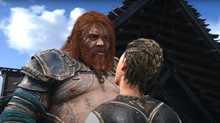
Brought to Odin's great hall, Heimdall reveals that he has no intention of letting Loki speak to Odin, and calls over some soldiers to test out their new "practice dummy", believing Loki's intentions to be treacherous. After watching from a distance as all Einherjar are defeated, Heimdall joins in the fight and bullies Loki, taunting him endlessly, and shows remarkable skill, as Loki cannot land a single hit on him, even with his arrows.. Eventually, Heimdall kicks Loki to the ground. Thunder rumbles through the sky, Heimdall expresses annoyance, realizing that Thor is nearby, catching an incoming arrow from behind that splashes mud on him. Enraged, the cocky god goes to finish Loki off, but Thor stops him from going any further. Their conversation gets a little heated, as Heimdall refuses to heed Thor's threats, but when the God of Thunder tells him to look into his eyes to see what he'd do to him, Heimdall backs down, calling him a "sick man".
Odin then arrives, questioning why Loki is covered in dirt, so Heimdall answers innocently that Atreus is treacherous and means to betray him. He smirks when Odin takes his side for a second, until he's surprised to see that he was only joking. Along with Thor, he's told to go away, much to his confusion. He almost becomes jealous to hear that his superior is all over Loki, walking away after apologizing and respecting the Allfather.
Mission on Helheim
| “ | Well... I suppose I should expect NOTHING less from half-breeds. | ” |
–Heimdall insulting Loki | ||
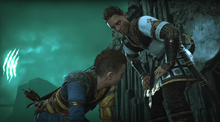
Assigned on a mission by Odin, Heimdall goes to Helheim with Loki and Thrúd, who calls them a "bore" as soon as he leaves to fulfill his objective. Seeing that Loki had freed Garm, a dangerous wolf that was chained, Heimdall furiously confronts Atreus over his actions, explaining that Garm creates holes between realms, that being the reason why the beast was locked up. He insults Atreus, claiming he should have expected nothing less from a "half-breed". When Loki tries to confront him, Heimdall delivers a swift pommel strike from his sword to Loki's gut, and tells a downed Loki he can call him whatever he liked. He then questions Thrúd's loyalty when she calls it an accident, making her angry enough to try to hit him. She gets angrier when he starts to insult her father Thor and calls him a "fat, drunken utter piece of trash."
It then gets personal when he goes too far and talks down on Thrúd's dream to become a Valkyrie, stating that she'll never become one because Odin wouldn't think her worthy of that title. Luckily, Loki manages to hold her back, explaining that Heimdall's only goal is to get her angry. Really excited to see Odin's face when he hears what just happened, the cocky god is in a real hurry to get back to Asgard and rubs the shame all over the teens' faces while they do so. When they return from Helheim, Heimdall explains everything and tells the two to get out so that he and Odin can have a private talk.
Throughout most of the game, the cocky god is everyone's main target from then on to stop Ragnarök, as he has the very thing that'll start it, Gjallarhorn. Between needing to steal Gjallarhorn and learning from the Norns that Heimdall plans to kill Loki, Kratos sets out with Brok to find "the lady", and her abilities allow her to create a powerful god-killing weapon made from the ring Draupnir, its primary target being Heimdall.
Duel with the Ghost of Sparta
| “ | And you must be the little half-breed's father. LUCKY DAY! You have a lot to answer for, sunshine. | ” |
–Heimdall upon noticing Kratos | ||
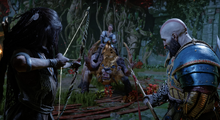
When a rescue party is sent to go rescue Freyr from the Einherjar, Heimdall seizes the opportunity to ambush both Kratos and Freya. Correctly assuming that he was facing the Ghost of Sparta himself, the God of Foresight showed no sign of alarm, confident that his own abilities would allow him to win this fight. Promising Kratos and Frigg no leniency, he did not forget Mimir as well - whom he considered a straight-up traitor for having turned on the All-Father. At first, Heimdall merely confronts Kratos astride Gulltoppr, trying to use the beast's brute force in an attempt to unsuccessfully crush the Spartan. However, it didn't take long for Kratos to catch the Gradungr by the horns and impale it against the wall, before finishing it off with the Blades of Chaos. Only then, after callously kicking Gulltoppr's corpse, does a disappointed Heimdall find himself forced to directly confront the Ghost of Sparta. The latter's brute force would certainly have allowed him to easily overpower his opponent, if it wasn't for Heimdall's incredible gifts of intuition.
| “ | Oh, wait - you expected the STICK to give you an advantage? | ” |
–Heimdall mocking Kratos | ||
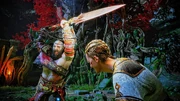
While the God of Foresight knew he would not stand a chance in a hand-to-hand brawl against Kratos, he was still able to predict and dodge every single hit his opponent tried to land on him. At first, Heimdall took genuine pleasure in mocking and dodging the Spartan, fighting Kratos very much in the same way he faced Atreus in Asgard. Ever the nonchalant, he would even try to hit Kratos with Gjallarhorn, although he mostly relied on his mastery of the Bifröst. However, he ignored that the Ghost of Sparta had a trick up his sleeve, specifically meant to take the Bearer of Gjallarhorn off-guard despite his powers. While Heimdall indeed intercepted the spear Kratos launched at him, he was too busy taunting Kratos to realise that it was a replica that would explode in his hands. While not damaging him, it did leave Heimdall stunned, leaving him open to attack, but he was able to recover quickly as he dodged a series of punches from Kratos. The second time, Heimdall was forced to block one of Kratos' punches with his bracers, but still remained confident. Finally, the third combination of punches proved to be the battle's turning point, as Kratos managed to land the first attack Heimdall has ever felt in his entire life, thanks to the Draupnir Spear. Astonished at actually being hit by an opponent, Heimdall begins to take the battle more seriously.
| “ | You ACTUALLY HIT ME! | ” |
–A shocked Heimdall to Kratos | ||

Badly shaken, the Herald of Ragnarök felt it was time to use his realm shift, which allowed him to slow down time for a few seconds and thus, grant him more leeway to try and strike Kratos, though the later seemed to manage. But as he became angrier, Heimdall started to lose his ability to focus and with it, his very foresight. So much so that his opponent was now able to successfully hit him multiple times with little effort, even being able to attack with weapons besides Draupnir. Likewise, thanks to centuries of relying on his powers of foresight to win, Heimdall was not used to being forced to use his Hofuðn offensively, using it more to shield and bat away Kratos and his attacks. When Kratos strikes him again with Draupnir, Heimdall tries to wrestle it away from the Ghost of Sparta, and furiously proclaims that Kratos' winning was only luck. However, he soon learns what power Kratos truly has when he pins him to a wall and stabs him in the arm with his spear. Heimdall screams in pain, which he has never felt before, and pleads for Kratos to stop. Obliging, Kratos ceases his assault and tries to convince Heimdall to walk away. However, having gotten used to the pain, Heimdall then angrily accuses Kratos of sparing him out of pity, and deduces that Kratos is being merciful because of Loki. This makes the god furious, promising the god killer that his son will be dead the next time they lock eyes with each other, this warning, coupled with the Norn's prophecy, caused Kratos to blow up Heimdall's arm as a consequence. After Heimdall collapsed to the floor in agony, Kratos cautions Heimdall he was on his final warning, though Mimir doubted this would mean much to the Aesir.
| “ | YOU do not get to DECIDE MY FATE! | ” |
–Heimdall to Kratos | ||
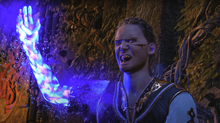
Last stand and death
Utterly shocked in pain and now on the verge of madness, a desperate Heimdall used his anger as well as his mastery of Bifröst to actually construct a new arm from the stump of the one he just lost, at the cost of excruciating pain. Fueled with hatred and berating Kratos for having humiliated him, a prideful Heimdall declared that the Ghost of Sparta did not decide his fate before recklessly charging at his opponent in an attempt to kill him for good. The severely wounded Aesir now throwing everything he had at Kratos, making generous use of his prosthetic Bifröst arm the environment at his advantage. By this point of the fight, the God of Foresight discarded his sword and lost much of his intuition and blinded by the rage that consumed him, allowing Kratos to strike him more frequently. In retaliation and struggling to get the better of the Spartan, Heimdall took a vicious pleasure in insulting Loki by promising Kratos to personally deal with his son in the most painful way.
| “ | I am going to find that little MONGREL of yours and BEAT his face into a PULP. | ” |

But those repeated threats as well as Heimdall's stubbornness only succeeded in enraging the Ghost of Sparta, as things became more personal between the two gods. Heimdall throws dirt in Kratos' eyes, infuriating Kratos, who knocks Heimdall down with a vicious combo before repeatedly smashing his head into the ground. The God of Foresight soon found himself strangled to death by an enraged Kratos, in spite of Mimir desperately trying to make his friend listen to reason. Nevertheless, while Kratos swore never to fall back again into his old ways, he would make an exception with the treatment he reserved to the unfortunate Heimdall for his threats to his son. And with his Bifröst-arm fading into nonexistence, the Bearer of Gjallarhorn would spend the last seconds of his life in pure terror, as he looked into his enemy's eyes.
| “ | Monster... | ” |
–Heimdall's last word | ||
Aftermath
Heimdall's death greatly shook Kratos, who realized that he had lost control of his anger completely and given in to his younger self to defeat the Watchman of the Aesir, fearing that this proved the Norn's prophecy right. Shakily, he took Gjallarhorn and Hofuð, before setting out to save Freyr, with Mimir lamenting whether they were breaking fate or fate was breaking them.
Heimdall's fealty to Odin and Asgard ultimately proved to be his demise, like many before him. His arrogance certainly played a big part in it, as he plotted to murder the son of Kratos, eventually making him a primary target of the Ghost of Sparta. More than that, his brutal and unexpected death would prove to have tremendous consequences for the Nine Realms, as it completely defied the prophecy and gave his enemies the key of the final victory over the Aesir. While not many people would regret his death, and none would mourn him, Heimdall's demise deprived Asgard from one of its most valuable assets, as the Bearer of Gjallarhorn was supposed to fulfill his destiny by the time Ragnarök comes. Instead, it would be Kratos and his allies who would blow the legendary horn, thus bringing forth the doom of Asgard sooner than expected.
Later, three-limbed Heimdall's corpse was found by Forseti, who uncovered evidence that Kratos is responsible for his death. Seeking out Sif, he presented the evidence that he had found. Consequently, as a result, the killing of Heimdall fueled Sif's hatred for both Kratos and Atreus. In addition, she travelled to Niflheim with the Valkyries Hrist and Mist to arrest Atreus for his father's actions, though Odin prevented them from doing that, which only worsened the situation.
Appearance
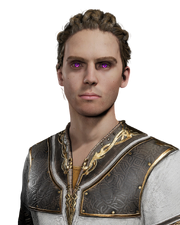
While Heimdall appears as an average man with a rather handsome face, pale skin and blonde braided hair, the most striking thing regarding his appearance are his glowing purple eyes (regarded as "more pink" than regular bifröst by Sindri), fueled with Bifröst. His gold teeth are yet another characteristic of the God of Foresight, something for which he gained the nickname of Gyllentanne/Gullintani (Goldentooth). His strange affinity with gold is further emphasized not only by the presence of this precious metal over his left ear, but also by the very outfit he wears.
Out of all the Aesir gods – and possibly all the characters in the series, Heimdall is by far the most distinguished, even compared to Odin himself. The Watchman of the Aesir seems to have luxurious tastes and as such, he is seen wearing a sumptuous white tunic covering him up to his knees, adorned with high quality leather covering the upper chest and back as well as the shoulders, honoring his high status and particular role as the bearer of Gjallarhorn. The symmetrical knotwork in this tooled leather seems in keeping with his formal and rigid worldview, he also has some ancient Aesir iconography in parts of the leather. Above his sleeves there's a particular design displaying Asgard's ascendancy over the other realms, Mimir says this symbol is reserved for the High House of powered Aesir, which Heimdall wears with pride. He has a ribbed copper thread collar edge, his light woolen tunic favors speed, mobility. Underneath his white tunic, over his arms the leather's more of an undergarment. Also underneath his tunic, Heimdall wears a golden shirt whose sleeves are made of a seemingly comfortable brown gambeson. A very thick leather skirt – adorned with a multitude of silver plates – covers him from the waist down to the knees, firmly held to his tunic thanks to a pair of belts. On his belt he wears a bronze-plated waist guard, exquisite knotwork tooling on cow leather, with burnished bronze ornamentation— symbology, Sun symbols to reflect his reputation as ‘the shining god’. Over the end of his tunic he wears, iron tiles to upgrade protection without compromising nimbleness and an Aesir design made of gold to match the end tip on his belt. Two objects are constantly attached to his belt: a sumptuous scabbard containing his personal sword, and obviously Gjallarhorn itself. As for his forearms, they are well protected with beautifully crafted brown bracers, his bracers are made of tanned Graðungr hide. This protection is perfectly assorted to his thatched boots as well as his pants, also made of high quality leather and tufted cord, there is more burnished gold knotwork in a traditional Aesir style on his boots.
Heimdall carries his golden sword, Hofuð. It is the work of Asgardian master smiths. During combat Heimdall imbues it with bifröst, he himself has mentioned how little he actually needs to use the sword.
Heimdall also carries Gjallarhorn. It was given to Heimdall by Odin, specifically meant to be used for Ragnarök. It has an intricate golden design, jewel-studded grip, also gold depicting a ram, quite similar to Thor’s ram motifs. This is either a coincidence or a reference to Heimdall's connections to rams in Norse mythology. Its origins and where Odin got it are currently unknown.
Personality
| “ | He's a lot. I know. Very perceptive, but sometimes he just forgets to think, you know? | ” |
Heimdall was described as a loyalist and true believer in Odin's cause. As such, he is incredibly loyal to Odin, but he will try to go against Odin's will if he senses a threat to the All-Father. He is snarky, condescending, arrogant, and cruel. This is best seen when he belittled Atreus and Thrúd, as he knew that they are inferior to him in power. Despite his power, however, Heimdall is somewhat cowardly and fearful of people of greater power, as he backed down from harassing Atreus due to Thor's intervention and begged Kratos to stop attacking after the latter impaled his arm to the wall with the Draupnir Spear. Nonetheless, Heimdall can still be defiant in the face of adversity even towards superior opponents and his extreme arrogance would overpower his sense of self-preservation. When Kratos had impaled his arm and even blew it off Heimdall still rejected his mercy and continued to mock him and threaten Atreus, furious that someone would attempt to decide his fate and fought to his last breath until it eventually resulted in his violent death.
Even then, he is vindictive and cocky, as he believed he could take down Kratos despite the knowledge of the man's horrible deeds and reputation. His vindictiveness and fragile ego ultimately lead to his demise, as he was infuriated with the idea that Kratos was looking down on him, continuing to fight to the death after Kratos offered to spare him, something that Heimdall's pride would never allow him to accept.
His rivalry with Atreus appears to have been formed out of jealousy as Heimdall's hatred for Atreus stems from Atreus getting special treatment from the All-Father, which makes Heimdall feel begrudged and pulled down since Odin is deliberately ignoring his warnings that Atreus is a threat to him and Asgard. After Atreus and Thrúd release Garm, Heimdall is more than eager to voice his excitement over Atreus having to explain his mistake to Odin and he repeatedly tries to assert dominance over Atreus by pointing out his flaws.
His foresight is something he held in great confidence as it was the one power that made him untouchable, above everyone else. Due to his invaluable, irreplaceable position as Odin's mind-reader meaning Odin and his allies could never truly get rid of him, coupled with his abilities contributing to a record of having never lost a fight, Heimdall's ego grew massively. This escalated to the point that he became extremely arrogant and fond of bullying others around him simply because he could get away with it. He has a habit of giving insulting and cruel nicknames to belittle everyone around him, referring to Atreus as a “half-breed”, Freya as “Queen Mistletoe", Freyr as "Sizzles", and Kratos as "Sunshine". Despite this, his foresight was not infallible. Brok figured out that with such heightened senses they could be overwhelmed given enough stimulation. When this was proven right by the spear created from the self-multiplying ring Draupnir, Heimdall was infuriated and surprised when his signature ability failed him, causing him to become even more careless in his rage and forced to rely on the physical abilities he had neglected for so long.
In addition, he doesn't hold many people in high regard, as he can see into a person's mind - including things that they don't even know about themselves - causing him to see the worst in everyone; the only exception being Odin. He proves to be wound up extremely tight and distrustful of everyone around him due to this, causing Sindri to even use "straighter than Heimdall" as an adjective to describe the quality of his mistletoe arrows. Furthermore, Sindri mentions that Heimdall is "unpopular at parties," showing that even among the Asgardians, he is widely held in contempt. In The Great Lodge, he is seen drinking mead away from the rest instead of socializing with any of them, likewise, a few Asgardians are even heard by Atreus complaining about the God of Foresight. This profound misanthropy is shared because of Heimdall's abilities he detests everyone lying to him and themselves and likewise Atreus claims “everyone hated him” after his death directly to Odin and his father only agreed. Even Heimdall's personal mount, Gulltoppr, is treated with contempt, insulting it whenever it fails in any way and kicks its corpse when the beast is slain by Kratos. However, Heimdall does show a measure of interest, or more accurately, amusement when he is unable to perceive the intentions of someone when they don't have a full grasp of who they are and what they want, as is the case with Atreus. Ironically and somewhat tragically, Heimdall was blind to the true nature of Odin, a notorious liar and manipulator, only seeing what he wanted in his father or genuinely believing his father was a benevolent ruler.
Odin himself notes that Heimdall's powers of perception are blatantly imbalanced by his inability to think things through much less cope actually well with the consequences of his own actions, a dangerous combination to harbor in a person. True enough, as the All-Father predicted, Heimdall's arrogance and short temper became his downfall in the end, getting reckless during his fight with Kratos after the God of War only got a single hit in and refusing to stand down when the latter offered him mercy. The irony in this is perhaps best exemplified by Heimdall's own statement that "[Kratos] will not decide [his] fate", only for him to seal it himself by repeatedly provoking the God Killer.
Despite his arrogant, rude and pompous demeanor, he is not entirely devoid of redeeming qualities. The fact that he despises those who hide their true intentions and never mean what they say shows he dislikes lying and prefers to tell the truth. This is likely the reason for his openly contemptuous and demeaning attitude, as he believes it is better to be honest about his supposed superiority over treating others with a false kindness, an attitude that Atreus ironically began to develop when he learned about his godhood. Furthermore, many of his actions are driven by the love he has for Asgard and his willingness to protect it.
Heimdall is also shown to be as vain about his appearance, given his luxurious taste in clothing and accessories. He was particularly annoyed when Kratos touched his bracers during their fight. Even his mount, Gulltoppr is adorned with gold and saddled with high-quality leather.
Relationships
Odin
| “ | Are you finished? Now, what could Odin, All-Father, king of the Aesir, possibly want with the likes of you? | ” |
–Heimdall to Loki | ||
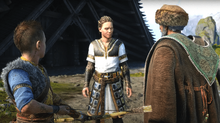
Of all Aesir, Heimdall is the one who most respects and idolizes the All-Father, with probably Odin manipulating Heimdall to be like this. Heimdall is said to be Odin's left arm, a proof of this was when Odin gave him Gjallarhorn, or when he was tasked with protecting Asgard. When Heimdall sees that All-Father is in danger, he does everything to make the danger pass, even if he sometimes has to stand against Odin. When Atreus arrived in Asgard, he tried insisting that inviting him to Asgard was a mistake as it would put Odin's life and the safety of Asgard at stake. He is incredibly devoted to fulfilling Odin's wishes, pleased to report the success of his mission to Odin.
Unfortunately for Heimdall, despite being favored more than rest of the All-Father's servants and Heimdall being truly devoted to the All-Father, Odin only ever saw his watchman as another tool at his disposal. A valuable tool but a tool nonetheless. After Heimdall was killed by Kratos, Odin hardly seemed distressed by his death, only concerned on the implications of what Heimdall's death would bring and annoyed that he lost Heimdall's useful foresight abilities. Not to mention that Gjallarhorn came into the possession of Aesir Watchman's killer, meaning that Ragnarok could be triggered at any time of Kratos's choosing. Though after mortally wounding Brok during his standoff with Kratos, the All-Father stated that if the dwarf died, then they would be "square" for Heimdall, suggesting that Odin had some care for him but more than likely he was using him to justify his murder of the Huldra Brother.
Thor
| “ | You see, everyone takes it easy on you because they are afraid of your father. I am not. That fat utter drunken PIECE OF TRASH! | ” |
–Heimdall lashing out to Thrúd about Thor | ||
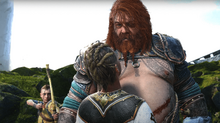
Heimdall's relationship with Thor is an interesting one. Although he likes to pretend the contrary, Heimdall is aware of the God of Thunder's reputation, but has the confidence to challenge Thor directly. When the Watchman of the Aesir attempted to finish Loki off in front of the Great Lodge in Asgard, Thor intervened just in time to save the boy's life. Heimdall could not tolerate this, and he did not hesitate to provoke the God of Thunder. The latter kept his calm, and told Heimdall to look into his eyes, knowing that the God of Foresight would read minds and see things that other could not. The vision Heimdall saw was enough to disgust him and force the Bearer of Gjallarhorn back down. What happened between the two of them only further increased their personal rivalry, and because Heimdall could not confront Thor directly, he unleashed his fury upon Thor's daughter instead. When Thrúd, Loki and Heimdall went on a mission to Helheim, the Watchman of the Aesir seized the opportunity to bully Thrúd while copiously insulting her father. This moment proved that Heimdall knew of Thor's struggle with alcohol, and he deeply despised him for his rather unattractive appearance. All in all, Heimdall simply had not the slightest respect for Thor, a fact further emphasized by the latter's half-giant condition.
Týr
While not much is known about Heimdall's relationship with Týr, Týr's particular affinities with the Jötnar - the very archenemy of the Aesir - certainly got him on the wrong side of the God of Foresight. Not only that, Týr represented pretty much everything Heimdall hated: his half-giant condition very likely made him a Jötunn - in another word, a bastard - in Heimdall's views, as well as a traitor for having tried to protect the Giants from Odin's fury. His peaceful intentions, and the fallen God of War's interest in traveling across the other pantheons and discovering different cultures were utterly contrary to Heimdall's own worldview, which considered Asgard as the heart of the civilized world, destined to rule over all the others by sheer force. When Odin took action and had Týr imprisoned in Asgard, the Watchman of the Aesir likely supported All-Father's decision and more than ever, considered himself as the only person the All-Father could really trust.
Baldur
| “ | Baldur had the luxury of not caring how badly he got burned. | ” |
–Heimdall to Loki | ||
Heimdall doesn't seem to have a good relationship with Baldur. When Loki stated that Baldur's feat of taming Dagsetr was greater than Heimdall's feat of taming Gulltoppr, he stated that Baldur could only do so due to his curse, while Heimdall made it "fair and square", showing that Heimdall had a rather low opinion of Baldur. Nevertheless, it is interesting to point out that when Heimdall battled Kratos in Vanaheim, he mocked the Spartan by expressing his surprise that his opponent managed to take down Baldur. This implies that the God of Foresight has at least some degree of respect towards his fellow Aesir. This could be explained by the fact that out of all Aesir, Baldur had the closest personality to Heimdall: both were ruthless and utterly despised their surrounding, both were born from two gods and both were virtually invulnerable (Baldur; thanks to his curse, and Heimdall; thanks to his gifts of intuition). Last but not least, they both had the favors of Odin and were entrusted with the most crucial missions. While it is likely that Heimdall did not regret much Baldur's death at the hands of Kratos, his demise still let a bloody strain upon the prestige of the Aesir family - a reality that the God of Foresight could not accept. Although it's just as likely that even if Heimdall thought of Baldur as lowly as he did with Thor, he still did acknowledge he was an immensly powerful being who was unlikely to be defeated.
Magni & Modi
Not much is known of Heimdall's relationship with Thor's sons since the three of them are never seen interacting together in the series. However, considering their reputation across the Nine Realms as perfect idiots, it is likely the God of Foresight thought very low of them. This fact is compounded by Odin's own negative opinion towards them, since the All-Father is generally considered to be more lenient than Heimdall when it comes to thinking about the others.
Thrúd
| “ | You have a lot to learn, little girl. Starting with who your family is... and who it is not. | ” |
–Heimdall to Thrúd | ||

It clearly appears that Heimdall has little to no respect for Thrúd, a sour feeling possibly fueled by his conflicted relationship with Thor himself. Heimdall knows that the God of Thunder loves his daughter, but he makes sure that Thrúd's position in the Aesir family never overshadows his. The Watchman of the Aesir considers himself to be so much above Thrúd's aspirations to becoming a Valkyrie, a feat he deems impossible. When he saw Atreus and Thrúd getting along despite Atreus' being their technical enemy, Heimdall displayed an ever deeper contempt towards them. When Thrúd's mission in Helheim turned into a catastrophe, Heimdall seized the opportunity to bully her alongside Loki, and then took genuine pleasure in berating her behavior to the All-Father. This was yet another proof of Heimdall's depravity and sadism.
Frigg
| “ | Oh. If it isn't Queen Mistletoe herself - Hilarious by the way. | ” |
–Heimdall to Frigg | ||

Heimdall's relationship with Frigg isn't much different from the others, and we know very little of the time they both lived in Asgard. Since the fallout of Freya's marriage with Odin, the Vanir goddess and Heimdall never saw each other again, until they met one last time in Vanaheim. His very first words towards Freya are carefully chosen to both insult and re-open old wounds that never fully healed since the death of Baldur. His low opinion of the Vanir goddess if further evidenced by the mere fact that, besides Odin himself, he is the only one calling her "Frigg". To Freya, such a name is a painful remember of the time she was still the wife of Odin, in Asgard. Heimdall knows this and how she struggled to get used to the Aesir way of life and traditions. He also likely held a personal grudge against her since the day she abruptly put an end to her marriage with the All-Father, which would have been more or less a case of absolute betrayal in Heimdall's eyes. When they met in Vanaheim, Freya's home, he likely wanted to flaunt himself in a position of strength, that of the Aesir who rule over all the other peoples. The Watchman of the Aesir certainly intended to capture Freya alive along with Mimir, and bring them to Odin.
Mimir
| “ | Not in this reality, traitor. | ” |
–Heimdall to Mimir | ||
Heimdall and Mimir met for the first time when the latter came to Asgard long ago, and progressively became Odin's personal advisor. Little is known of the relationship they had back then, but the two of them were definitely in competition to gain the All-Father's favors. When the Smartest Man Alive irrevocably fell out with Odin, the Watchman of the Aesir seized the opportunity to become All-father's closest advisor. Because of this, Heimdall's loyalty to Odin meant that he could only utterly despise Mimir after the latter teamed up with the Ghost of Sparta. Heimdall regarded this as an act of high treason, and sought to capture Mimir alive to handle him over to the All-Father - the promise of a fate worse than death. Despite of the apparent animosity between them, Mimir showed some concern when Heimdall was about to meet his end at the Spartan's hands, with Mimir even imploring the latter to please restrain himself, if only to prevent Kratos from succumbing once more to his darker impulses.
Loki
| “ | You are chaos in a spiffy archer suit. I watch your mouth move and I see cities burning. | ” |
–Heimdall to Loki | ||
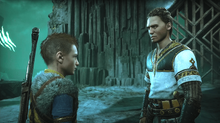
Heimdall's relationship with Loki is characterized by a deep hatred fueled by jealousy, vanity and mistrust. When Heimdall met Atreus on the top of Hrimthur's Wall, he attempted to murder the young man by dropping him, then tried kill him once more in front of the Great Lodge before being interrupted by Thor's arrival. These actions stemmed from a mixture of jealousy that Odin had invited Loki into Asgard despite being a Giant, as well as the visions he saw of Asgard burning to the ground thanks to Loki's arrival. Because of this, the Bearer of Gjallarhorn was persuaded that Loki was secretly plotting the destruction of Asgard. However, the boy benefited from Odin's protection - much to Heimdall's fury and jealousy, and the latter couldn't simply kill him immediately.
Since Loki was working for the All-Father, the Watchman of the Aesir seized every opportunity to minimize or simply ignore Loki's efforts. When the mission in Helheim turned into a catastrophe for Loki and Thrúd, a delighted Heimdall started insulting and bullying Loki, knowing that nobody would come to his aid. Heimdall's irrational hatred towards Loki showed up even more when he dueled Kratos in Vanaheim. When the Aesir god understood how much the Spartan cared about his son, he in turn copiously insulted Loki and made it clear of how much pleasure he would take in beating the boy to death, displaying an incredible amount of sadism and sheer cruelty. Heimdall's satisfaction at such thought was double: not only did he unleash out his hatred, he also struck a nerve and finally made Kratos lose his control for good. But Heimdall would never have the opportunity to finally beat Loki's face into a pulp, as he himself met an absolutely brutal end at the hands of Kratos.
Kratos
| “ | FOREIGN… TRASH! | ” |
–Heimdall near the end of his duel with Kratos | ||
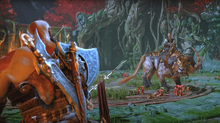
Ironically, Heimdall was never supposed to meet the Ghost of Sparta in the flesh, if it wasn't for his obsession with Atreus. Although Kratos only started paying attention to the God of Foresight after he met the Norns, Heimdall already knew who the Spartan was, and what he had done since his arrival in Midgard. For the Watchman of the Aesir, Kratos was nothing more than an outlaw, a foreigner who brought shame and disaster upon the Aesir due to freeing Mimir, Odin's prisoner, as well as killing Magni, Modi, and Baldur. Despite the impressive background of the Spartan, the God of Foresight was confident in his own abilities and his gifts of intuition that would give him the advantage upon Kratos.
When the two gods finally met for the first time in Vanaheim, Heimdall immediately understood that he was also facing the father of Atreus. During the battle, Heimdall took immense satisfaction in mocking Atreus. He also displayed his incredibly formal and rigid worldview by pointing out the fact that both Kratos and Atreus were mongrels, yet another proof of the low esteem Heimdall had for the Spartan. But when the Spartan hit him for the first time thanks to his spear, Heimdall began losing his composure and took the fight more seriously. The Ghost of Sparta, however, took advantage of Heimdall's lack of strategy and ended up blowing up his right arm. This caused Heimdall to fill with rage, refusing to accept being spared out of pity due to his immense pride. Instead, he used his unmatched mastery of the Bifröst to create himself a magical arm, giving him a chance to resume the fight. His stubbornness, and his promise of giving Atreus a bloody death, ultimately signed his death warrant. When Heimdall brutally fell under the Spartan's hits, he understood too late that he unleashed the monster that slept inside Kratos.
Powers & Abilities
Powers
| “ | ”Now tell me of this power Heimdall wields. He sees the future?” “More like… he reads the person. Sees their intention” “My intent will be to kill him. Knowing that will be no advantage” “Brother, this is no one to underestimate. Any move you make, he’ll have seen it coming. |
” |
As an elite Norse God and an Aesir, Heimdall possessed immense superhuman physical abilities and supernatural powers. He possesses immense skill and combat capability, personally trusted as the watchman of Asgard and the left-hand servant of Odin himself, famed for never being harmed or losing a battle thanks to his senses according to Mimir and Sindri. The only Aesir that surpass him in power is Odin, who entrusted Gjallarhorn to his eldest son knowing no one would be able to surpass his foresight.
- Immortality: As a Norse God, Heimdall is immortal. Only a sufficiently powerful weapon or an extremely powerful being can kill him.
- Enhanced Senses: Being the God of Foresight, Heimdall can hear and see things in the Nine Realms further than anyone else down to the smallest detail. This is seen as he was aware of Atreus climbing on the wall and when he was eavsdropping by Odin´s cabin while being inside.
- Superhuman Strength: As a god and one of Odin's sons, Heimdall possessed great strength. Although Kratos easily proved to be steadily stronger than Heimdall in the majority of their phases, after Heimdall conjured a spectral arm with Bifröst energy after he lost his arm, he was able to punch Kratos several feet into the air, knocking him away even though Kratos tried to block the punch. Heimdall also can briefly grapple with and stun the Greek God of War with his blows. He also was able to shove his hand into the ground and lift out a sizable chunk of stone, throwing it a great distance.
- Superhuman Durability: As one of the most powerful Aesir gods, Heimdall possesses strong durability, being able to endure hits from all of Kratos' weapon arsenal. Although, he isn't as durable as other Aesir gods, as Kratos was able to make him bleed with a single punch and used the Draupnir Spear to pierce through and blow up Heimdall's right arm. Heimdall, however, does possesses fast adaptation and great endurance, as he is able to quickly recover from the pain brought upon by his destroyed arm and is able to continue fighting aggressively soon after.
- Superhuman Speed: During the battle with Atreus and Kratos, Heimdall was able to move at extremely fast speeds around them to the point of almost looking like teleportation at times. Even in point-blank range, Heimdall has superhuman fast reflexes, capable of dodging and parrying superhumanly fast attacks and casually dodging Atreus' arrows, blasts of lightning, Kratos' punches, and even the extremely fast strikes of the Blades of Chaos, an achievement in which not even any of Kratos' adversaries, including Greek gods, have ever done before.
- Bifröst Manipulation: Heimdall could utilize Bifröst energies to attack his enemies with projectiles, make prosthetics in case of injury, and coat himself in a protective aura that acted as armour to nullify attacks. His mastery of Bifröst was such that he could utilize the energy in ways none else could with exception of Odin, who was the only one who could surpass him in this regard.
- Conjuration: After losing his right arm to Kratos, Heimdall was able to conjure up a spectral version of his arm out of Bifröst energy to act in place of the one he had lost. This spectral arm works just as well as his actual arm and was corporeal despite its intangible-looking appearance. In addition, he was able to summon spectral armor around his body which protected him and allowed him to deal out extra damage. He could also infuse his energy arm with even more power so that it would explode on impact with a target before reforming it and on capable of picking up boulders and, infused the boulder with Bifröst energy, and sent it flying at Kratos. The Bifröst energy also increased his physical strength, empowering Heimdall to effectively punch Kratos a great distance away.
- Foresight: Heimdall is able to see a person's next moves and intent by locking eyes, even to the point of being able to read another person's mind and thoughts. However, this precognitive capacity is based on the extent of the observed party also being consciously aware of the moves they are about to make, diminishing Heimdall's ability to anticipate them if they were randomly executed and not necessarily planned, meaning that he cannot read his target instinct and follow through erratic and unpredictable attacks. Therefore, he can be struck through pure chance; Brok notes that one can bypass the god's foresight by overwhelming his senses via forcing him to focus on more than one target at once. Hence the Draupnir Spear, able to near-infinitely multiply itself and having several of its copies thrown at the target's general location by the wielder from multiple trajectories. His own mindset also affects this ability, as the more blows Kratos landed on him, the more this ability diminished due to the rage and frustration of being hit clouding his mind.
- Precognition: While not displayed in his battles, Heimdall is stated to be capable of seeing, to an extent, a person's future.[1] This can be supported by the conversation Heimdall had with Atreus upon his arrival in Asgard, as the former said he can see cities burning in destruction and the latter was responsible for it.
- Chronokinesis: While fighting Kratos, Heimdall could slow down time to enhance his movements even further. While this doesn't affect him, it would affect Kratos to the point he was frozen in place for a few seconds. In addition, it also makes him immune to any time slowing effects that are used against him.
Abilities
- Basic Combatant: Thanks to his foresight, Heimdall is a capable combatant with "hundreds of years" worth of experience, capable of defeating any opponent thanks to his unique senses, foresight, and speed, which allows him to defeat nearly anyone without much trouble. He had easily beat Atreus and Thrúd, casually playing and toying with them without even being serious due to them being incapable of hitting him. According to Mimir, Sindri, Freya and Heimdall himself, he has never been defeated or even touched by those who challenged him until he was defeated and murdered by Kratos, whom was able to learn and adapt to how his foresight worked and eventually kill him. However, despite having "hundreds of years" of experience, the extent of Heimdall's actual fighting abilities is extremely limited, coming down to pushes and shoves, sloppy kicks, and strikes with the hilt of his sword. When that doesn't work, he will begin to throw large haymakers, showing his lack of actual fighting skills. His lack of training and fighting skills is noticed by Kratos after using and imploding the Draupnir Spear three times, with the two attempts to punch him being only to review the extent of his abilities and with the last attempt, he was capable of outmatching his foresight, grabbing his arm to make him unable to dodge and punching him for the first time in his life. After that, Heimdall started to become more impatient and overall inconsistent, something that Kratos took advantage of during their battle. After losing his right arm, pride and overall his emotional control, Heimdall started to become more volatile, unhinged, and incredibly reckless, throwing violent and unrefined punches, disregarding his own defense, safety and his trademark ability; his foresight. Combining all these traits and aspects, Heimdall's capabilities when it comes to martial prowess and tactical skills, are very poor, a fatal flaw that played a significant role in his demise at the hands of the Ghost of Sparta.
- Swordsmanship: Heimdall is a capable swordsman and was able to use his blade Hofuð and his reflexes to parry blows and disable opponents by quickly bashing them with the handle of his sword. However, like his combat abilities, his overall swordsmanship techniques and skills are rather limited, meaning that he only relies on basic thrusts and swings to attack.
Weapons
- Hofuð: The sword of Heimdall. While it is not the source of Heimdall's power, the blade too allows its wielder to utilize his realm shift abilities, freezing the world around them for a few seconds the same way he can. However, due to his over-reliance of his foresight over the centuries, Heimdall's actual skill with Hofuð was subpar at best, as he was scarcely able to remember when he used it for serious combat. Heimdall primarily used it more to deflect attacks and while unsheathed, mockingly bat away his enemies rather than actually hack at them since that's a sword's purpose.
- Gjallarhorn: While the purpose of this legendary horn is to be blown by his bearer at the start of Ragnarök, Heimdall does not hesitate to use it from time to time as a bat, mostly for fun while he toys with his enemies. His willingness to use the horn in battle despite the horn itself possessing no offensive capabilities is proof of the total confidence he has in his own abilities, and his utter contempt for his opponents.
Quotes
- ”Hello”.
- ”So… what part of the enormous wall made you think - “oh! Visitors must be welcome!”
- ”The All-Father sent for you? Great. Then why are you out there and not in here?
- ”You don’t even know, do you?”
- ”No, I don’t think I will. I think maybe I’ll drop you. Yes, I’m going to drop you. Goodbye”
- ”Heh. The Jötnar? Enemy of my people?”
- ”I will be the judge of that. This way, “Loki of the Jötnar”
- ”Obviously. Now feel free to drink in the splendour of Asgard, this is a rare sight for outsiders. Especially Giants”
- "Yes, why DON'T you steal everything that isn't nailed to the ground, that is sure to impress your hosts."
- ”Done drinking it in already? Cornerstone of civilisation in the Nine Realms not really your cup of tea? I see…”
- ”Oh, well… your approval means everything”
- ”Just ask your questions already”
- ”It is my job. Next question”
- ”I protect the realm I love from trouble”
- ”And I can already see that you are eager to prove yourself. Way too eager. Probably due to an overshadowing father figure you can never live up to”
- ”I would also guess that you are… disrespectful, entitled and… impulsive
- ”Oh, you are here to help people? Hmm. No, no. You are here to help yourself. To manipulate and lie to whoever you have to to get what you want. I know you're young. Your voice probably dropped while you were climbing the wall but what a twisted little soul you have. You are chaos in a spiffy archer suit. I watch your mouth move and I see cities burning. Nothing good is going to come from you being in Asgard”
- ”That said… if you are here to aid the All-Father and have no treacherous intent I guess that makes us allies”
- ”Gulltoppr… who loves me the most? Whooo loves me the most?”
- ”Baldur had the luxury of not caring how badly he got burned. I outthink them. Dominate them fair and square”
- "What? You think all Aesir are gods?”
- "Oh, well if Skjolder told you! Clearly whoever that is must be the authority on Aesir Gods, not the Aesir God you are currently talking to"
- " "Palace?"...Do you think the All-father needs to puff himself up like a mortal chieftain? [...] That, is the Great Lodge, which the All-father built with his own hands"
- "Real power, you see, does not need to flaunt. It emerges when the time is right. Don't you agree?"
- ”’’Hey, helmets! I brought you a practice dummy!’’”
- ”’’You see, the thing is---you DO have treacherous intent. So I am not letting you anywhere near the All-Father.’’”
- "That's right-- now show me all your stupid little tricks"
- "Oh no, arrows! How fearsome"
- "I do have to say, Loki... I am profoundly unimpressed. You should probably stay down."
- "You are a sick man."
- "Well... I suppose I should expect NOTHING less from half-breeds."
- "And you must be the little half-breed's father. Lucky day. You have a lot to answer for, sunshine."
- "Oh, wait- you expected the stick to give you an advantage?"
- "Boring!"
- "Mmm. I can feel your frustration, you know. It is immensely satisfying."
- "You ACTUALLY HIT ME!... I don't remember the last time anyone hit me."
- "Slow down!"
- "What is going on in that empty head? Oh no no no no no... you are going to spare me out of pity?"
- "You think you get to just walk away? No. That is not how this works."
- "YOU do not get to DECIDE MY FATE!"
- "I am going to find that little MONGREL of yours and BEAT his face into a PULP."
- "Monster..."
- "You see, everyone takes it easy on you because they are afraid of your father. I am not. That fat, drunken utter piece of trash!"
- "I find the hues and shades of your shortcomings almost moving. If we could only somehow harness your uselessness, we could fuel this city!"
- "You don't really know quite what you're doing here anymore. Sometimes I envy the All-Father. He always sees the best in people. While all I see is what people really are. Nobody ever says what they mean. Some lie to the world; some lie to themselves and don't even know it... And then there is you. You don't know what you want. You don't even know who you are. But I hope you do know this: I will be watching."
- "Don’t you know who I am? I am the watchman of the Aesir! The Herald of Ragnarök!"
- "Did you know your son sounds like a GOOSE when he gets hurt? HUH! HUH!"
- "You strike like a sloppy cow!"
- "Sizzles wasn’t looking too good last I saw him."
- "Well if it isn't Queen Mistletoe! Hilarious by the way."
- "Your incompetence haunts me."
- "LUCK, that's all this is!"
- "Did you attack with a squirrel? Who does that?"
- "The adults need to talk now Loki. Run along and play."
- "Well that was silly! You're a silly silly man."
- "Oh, very nice. With moves like that, it is a wonder that the Jötnar lost every war they ever fought."
- "Down boy."
- "If you run into trouble just scream so I know where to find your bodies!"
- "YOU ARE IN WAYYYY OVER YOUR HEAD!"
- "FOREIGN… TRASH!"
- "Oooooooohhhhh Nnnnnnnooooooooo! I'm just kidding."
Appearances
- God of War (2018) (Mentioned only)
- God of War Ragnarök
Gallery
Portraits
Panoramas
Concept Arts
Cosplay Guide
Trivia
- In recorded Norse mythology, Loki and Heimdall are destined to kill each other during the events of Ragnarök. As reference to this, in God of War Ragnarök, it is destined by the Norns that Heimdall will kill Atreus. However, this destiny changes when Kratos kills Heimdall before the events of Ragnarök begin.
- According to The Art of God of War: Ragnarök, Heimdall is the youngest of all the Norse gods.
- His Greek counterpart (in terms of being the God of Foresight) is Prometheus.
- Heimdall was the only Aesir god shown that doesn't have blue eyes, instead he has purple eyes that glow brightly when using Bifröst. He also is the only Aesir god to have no visible runic tattoos on his body. Odin, Thor, Sif, Baldur, Magni, Modi, Týr and Thrúd have runic tattoos on them. Even Freya, a Vanir goddess had them, likely from her marriage with Odin. As well as Atreus, a Jötunn/Greek god hybrid.
- Heimdall has a particular affinity with gold. In addition to his gold teeth, his sword is gold and his outfit is dotted with sumptuous gilding. This could be a hint to reflect his reputation as the "shining god".
- When Kratos pins his arm with the Draupnir Spear, Heimdall asks what's going on inside his “empty head”. While this could be just another insult, it is possible that it refers to Kratos fighting on instinct, something Heimdall might not be able to read.
- In Lúnda's Workshop Notes (Cosplay Guide), it is remarked that Heimdall's particular pink eyes aren't glowing the same way the Bifröst does. This implies that the God of Foresight's pink eyes are likely a side effect of his unique powers. This is further emphasized by the fact that the Bifröst indeed glows with a purple color, and so did Heimdall's Bifröst arm.
- When Heimdall is killed, one can notice by taking a closer look at his body that his eyes are fully black.
- In Lúnda's Workshop Notes, it is noted that someone might have flicked him on his right ear, which could explains why Heimdall is wearing golden attributes - possibly to hide an old wound.
- This could be a nod to another attribute of Heimdall in Norse Mythology, that being the fact that he removed one of his ears so he could hear what's going on throughout the realms.
- Heimdall's sumptuous outfit reflects his personality. The symmetrical knotwork in the tooled leather seems in keeping with his formal and rigid worldview, while the symbol of Asgard's ascendency over the Nine Realms can be noted on his shoulders.
- In the cutscene after Atreus' fight against Heimdall, Atreus' arrow in the cutscene gets some mud flecks over Heimdall, causing him to lose his cool after a moment. This, along with Odin's comment to Heimdall to clean himself up, could mean that Heimdall is either very vain (which is very much possible), or that he didn't foresee the mud getting onto him, foreshadowing how it is possible to bypass his senses.
- Heimdall was portrayed by Scott Porter, whose face was also used as reference for the character's facial model.
- Heimdall makes his first appearance during the seventh chapter in God of War: Ragnarök.
- Heimdall is the fourth and last Norse god to be killed by the main protagonists in the series, and the only god to be killed directly by the player in God of War: Ragnarök. Moreover, out of all the Norse gods he killed, Kratos felt satisfaction killing Heimdall, given that he made Atreus/Loki his target.
- The Herald of Ragnarök is the only antagonist in the Norse Era who successfully managed to make Kratos lose control for good, a feat that not even Baldur or Thor achieved. He paid it dearly and got by far the most brutal death out of all the Norse gods.
- Although his death is considered the most brutal death in the Norse Era, the community agrees that Heimdall's death can be considered a "mercy" compared of the deaths of Poseidon, Helios, Hermes, Hercules and Zeus, who all of them got killed in brutal, gruesome, painful and merciless ways at the hands of Kratos.
- Heimdall is also the only Norse God that tasted a glimpse of the Ghost of Sparta after looking through his eyes, realizing that Kratos lived through his reputation both as a god killer and a monster.
- Heimdall's personality is very reminiscent of that of Hermes from God of War III. His unbearable arrogance made him particularly hated among the community, who generally judged his brutal death at the hands of Kratos utterly satisfying and well deserved. In fact, Heimdall and Hermes share some similarities:
- Both were loyal to their fathers Odin and Zeus respectively.
- Both acted arrogant and condescending because of their powerful signature abilities. Hermes, due to his speed and Heimdall, due to his foresight.
- Both were offered a chance by Kratos to step aside or accept defeat, However both of them decided to keep fighting, finally sealing their fates.
- Both got brutal deaths at Kratos' hands after being defeated a second time. However, Hermes' death was far more brutal and vicious, While Heimdall got beaten into a pulp and strangled to death by the enraged spartan, Hermes got both of his legs cut off, dying in pain and agony.
- In the Japanese dub of the game, Heimdall's arrogance is further expressed by the way he refers to himself as Ore-sama; Ore in itself is already a self-dignifying variation of "I" whilst '-sama' is an honorific normally reserved for the most esteemed or revered individuals.
- Heimdall's boss fight soundtrack is composed by Bear McCreary, but hasn't been officially released. In reality, it is the theme used for Magni and Modi in God of War (2018), with some modifications for the final phase of the boss fight.
- In Norse mythology, he is the son of Odin and the Nine Mothers. Any kinship he might have in God of War Ragnarök is never brought up however.
References
- ↑ The Art of God of War: Ragnarök
| |||||||||||||||||||||||||||||
| |||||||||||||||||||||||||||||
| |||||||||||||||||||||||||||||
| |||||||||||||||||||||||||||||










